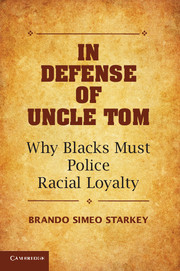Book contents
- Frontmatter
- Dedication
- Contents
- Acknowledgments
- Introduction
- 1 Solidarity, Social Norms, and Uncle Tom
- 2 Uncle Tom: 1865–1959
- 3 The Unwitting Pioneers
- 4 Uncle Tom: 1960–1975
- 5 No Man Was Safe
- 6 Uncle Tom Today: 1976–Present
- 7 So What About Clarence?
- 8 The Curious Case of Uncle Tom
- 9 What Now, Uncle Tom?
- Final Address
- Index
- References
5 - No Man Was Safe
Published online by Cambridge University Press: 05 May 2015
- Frontmatter
- Dedication
- Contents
- Acknowledgments
- Introduction
- 1 Solidarity, Social Norms, and Uncle Tom
- 2 Uncle Tom: 1865–1959
- 3 The Unwitting Pioneers
- 4 Uncle Tom: 1960–1975
- 5 No Man Was Safe
- 6 Uncle Tom Today: 1976–Present
- 7 So What About Clarence?
- 8 The Curious Case of Uncle Tom
- 9 What Now, Uncle Tom?
- Final Address
- Index
- References
Summary
Uncle Tom Civil Rights (Integrationist) Leaders
By the 1960s, black public figures understood that racial snipers tracked their every act, scoping for any misstep that signaled betrayal. In fact, missteps were frequently unnecessary for loyalty enforcers to rifle Uncle Tom accusations into situations clearly devoid of duplicity. Even the highest of cultural icons drowned in waves of criticisms during the 1960s and 1970s. Indeed, some whose lofty cultural status has posthumously grown too exalted to criticize were once submerged face first into a pool of Uncle Tom ridicule. Simply put, amid the second epoch, no status was too well fortified or too elevated to keep anyone safe from Uncle Tom.
This was especially true for integrationist civil rights leaders. Integrationists were ambivalently perceived, being among the most adored and reviled among their race. Many blacks considered them cultural heroes. They pushed presidents, Congress, and the Supreme Court to achieve equality under the law. John F. Kennedy orated in 1963, “One hundred years of delay have passed since President Lincoln freed the slaves, yet their heirs, their grandsons, are not fully free.” The black advocates for that full freedom were civil rights leaders, influencing Kennedy, his predecessor, Lyndon Baines Johnson, and congressional leaders to pass legislation granting blacks the equality that Brown failed to secure. Such leaders firmly believed that blacks’ road to full emancipation was racial integration.
Information
- Type
- Chapter
- Information
- In Defense of Uncle TomWhy Blacks Must Police Racial Loyalty, pp. 194 - 231Publisher: Cambridge University PressPrint publication year: 2015
